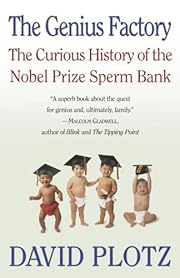

Click on a thumbnail to go to Google Books.
|
Loading... The Genius Factory: The Curious History of the Nobel Prize Sperm Bankby David Plotz
 None No current Talk conversations about this book. In his book, Plotz traces the philosophical origins of what was commonly called “the Nobel Prize Sperm Bank” and explains just how it failed to live up to his vision. He tells fascinating stories of donors, parents, and children and the mystery that surrounds their unusual, invisible relationship. He even shares a bit about his own small adventure in sperm donation. Although I found the personal stories really interesting, what I enjoyed most about this book was the way Plotz weaved in history, science, and social issues. The Genius Factory may claim to be about a single sperm bank with a unique mission, but it steps beyond that to take in societal attitudes about birth, genes, parenting, and more. All in all, an enjoyable, quick read about a quirky topic. See my complete review at Shelf Love. The book is rather creepy getting both into the entire field of eugenics and one man's idea of a Nobel sperm bank (although most of the donors were not, the original idea was to just have the sperm of prize winners in the fields he thought were important - no literature or peace winners for this guy). As well it details the effects of this on the families involved. This included the stress of hiding the secret as well as the pressure put on some of the kids to be 'genius babies'. Interesting read with both broader historical context and first person narratives. no reviews | add a review
It was the most radical human-breeding experiment in American history, and no one knew how it turned out. The Repository for Germinal Choice-nicknamed the Nobel Prize sperm bank-opened to notorious fanfare in 1980, and for two decades, women flocked to it from all over the country to choose a sperm donor from its roster of Nobel-laureate scientists, mathematical prodigies, successful businessmen, and star athletes. But the bank quietly closed its doors in 1999-its founder dead, its confidential records sealed, and the fate of its children and donors unknown. In early 2001, award-winning columnist David Plotz set out to solve the mystery of the Nobel Prize sperm bank. Plotz wrote an article for Slate inviting readers to contact him-confidentially-if they knew anything about the bank. The next morning, he received an email response, then another, and another-each person desperate to talk about something they had kept hidden for years. Now, in The Genius Factory, Plotz unfolds the full and astonishing story of the Nobel Prize sperm bank and its founder's radical scheme to change our world. Believing America was facing genetic catastrophe, Robert Graham, an eccentric millionaire, decided he could reverse the decline by artificially inseminating women with the sperm of geniuses. In February 1980, Graham opened the Repository for Germinal Choice and stocked it with the seed of gifted scientists, inventors, and thinkers. Over the next nineteen years, Graham's genius factory produced more than two hundred children. What happened to them? Were they the brilliant offspring that Graham expected? Did any of the superman fathers care about the unknown sons and daughters who bore their genes? What were the mothers like? Crisscrossing the country and logging countless hours online, Plotz succeeded in tracking down previously unknown family members-teenage half-brothers who ended up following vastly different paths, mothers who had wondered for years about the identities of the donors they had selected on the basis of code names and brief character profiles, fathers who were proud or ashamed or simply curious about the children who had been created from their sperm samples. The children of the genius factory are messengers from the future-a future that is bearing down on us fast. What will families be like when parents routinely shop for their kids' genes? What will children be like when they're programmed for greatness? In this stunning, eye-opening book, one of our finest young journalists previews America's coming age of genetic expectations. From the Hardcover edition. No library descriptions found. |
Current DiscussionsNonePopular covers
 Google Books — Loading... Google Books — Loading...GenresMelvil Decimal System (DDC)362.17Social sciences Social problems & social services Social problems of and services to groups of people People with physical illnesses Specific servicesLC ClassificationRatingAverage: (3.61) (3.61)
Is this you?Become a LibraryThing Author. |
||||||||||||||||||||||||||||||||||||||||||||||||||||||||||||||||||||||||||||||||||||||||||||||||||||||||||||||||||||||||
David Plotz writes insightfully and colorfully about the history and human relationships created through the sperm bank, about the meaning of family, and the drive to understand the genetic and experiential components of identity. It is an interesting and highly humanized tale, worth reading not by everyone but by the people intrigued by the premise. (